
In today’s swift and fiercely competitive business climate, businesses continually seek new methods to improve employee performance. Their ultimate goal is to achieve organizational success. HR system management, particularly the utilization of Human Resource Systems, is an important aspect of this undertaking.
These tools are not only changing the way HR departments work, but they are also crucial to performance management procedures. For businesses, having the correct Human Resource Systems in place is critical to developing a high-performance culture. It connects individual aspirations with larger corporate objectives.
In this blog, we will look at the function of Human Resource Systems in performance management, including how they improve everything from goal formulation to employee development and strategic decision-making.
So, let’s begin!
What Are HR Systems?
First, it’s essential to understand what Human Resource Systems (HRS) are and how they function within an organization. Human Resource Systems refer to a suite of software solutions that manage and automate core HR activities. These include recruitment, employee data management, performance evaluations, payroll processing, and benefits administration.
In today’s digital age, these systems have become invaluable for organizations of all sizes, thus allowing them to streamline processes. It reduces administrative burden as well as maintains accuracy in managing their workforce.
Moreover, HRS often integrates seamlessly with other business systems. A human resource management system creates a centralized platform where managers and HR professionals can easily access, analyze, and act upon employee-related data.
This integration simplifies workflows, minimizes errors, and improves communication between departments. As a result, businesses can focus on more strategic initiatives, such as performance management, that drive growth and success.
When implemented effectively, these systems empower organizations to monitor and measure employee performance more comprehensively and consistently. This is critical in developing a performance-centric organizational culture where employees are engaged, motivated, and aligned with the company’s goals.
Why Performance Management Is Essential to Business Success?
- Before looking into how Human Resource Systems may help with performance management, it is critical to understand why performance management is so vital to corporate success in general. Performance management is more than just measuring employee productivity.
It is a comprehensive process that includes setting clear expectations, offering ongoing feedback, and identifying development needs. This ensures that employee progress matches with the organization’s goals.
- In today’s business landscape, companies cannot afford to overlook performance management. First and foremost, performance management helps organizations maximize employee potential.
Therefore, by setting clear performance metrics and consistently monitoring progress, businesses can ensure employees remain engaged, motivated, and productive. Furthermore, effective performance management fosters a culture of continuous improvement, which drives innovation and business growth.
- Additionally, when businesses align performance management practices with corporate goals, they create a cohesive strategy. It encourages every employee to contribute to the company’s success.
In this context, the best HR system plays an instrumental role in enabling organizations to implement robust performance management frameworks.
Human Resource Systems to Enhance Performance Management
Streamlined Goal Setting & Tracking
One of the fundamental components of performance management is goal setting. When goals are clearly defined and aligned with organizational objectives, employees know exactly what is expected of them. However, setting and tracking goals manually can be a time-consuming and inefficient process, particularly in larger organizations.
This is where Human Resource Systems come into play. These systems provide tools that help organizations set SMART (Specific, Measurable, Achievable, Relevant, and Time-bound) goals for employees at all levels. Hence, by using an HRS platform, managers can ensure that individual goals are aligned with departmental and corporate objectives, thereby promoting a performance-driven culture.
Furthermore, Human Resource Systems allow managers to track progress in real time. It indicates managers can quickly identify any performance gaps and make necessary adjustments to ensure employees stay on track.
Let’s take an example. If an employee is falling behind on a key project, the system can notify the manager. It would allow them to intervene and provide additional support or resources. In addition to improving employee performance, this also enhances organizational agility.
Continuous Feedback with Real-Time Evaluations
Another critical aspect of performance management is providing employees with regular, constructive feedback. In the past, most organizations relied on annual performance reviews to evaluate employee performance.
However, this traditional method is increasingly seen as outdated and ineffective in today’s fast-moving business world. Employees require continuous feedback to stay engaged and motivated, and this is where Human Resource Systems can make a significant difference.
Modern HR systems enable managers to provide real-time feedback based on up-to-date performance data. Whether it’s recognizing an employee for their exceptional work or identifying areas for improvement, these systems ensure that feedback is timely and relevant.
Moreover, continuous feedback promotes a culture of transparency. Employees always know where they stand and can take proactive steps to improve their performance.
Through data analytics and reporting features, Human Resource Systems provide managers with the information they need to conduct more frequent and meaningful evaluations. These systems track key performance indicators (KPIs) and automatically generate performance reports, which can be used to guide one-on-one discussions.
Not only does this help managers stay informed, but it also creates a fairer and more objective evaluation process. In turn, this leads to improved employee engagement, higher retention rates, and overall better performance outcomes.
Personalized Employee Development
- Effective performance management is not just about evaluating past performance—it’s also about fostering future growth. One of the key ways to do this is by offering employees ongoing development and learning opportunities. Human Resource Systems play a crucial role in supporting employee development through integrated Learning Management Systems (LMS) and personalized training programs.
- By leveraging the data collected through performance reviews and assessments, Human Resource Systems can identify specific skills gaps or areas where employees need further development. For example, if an employee consistently struggles with leadership tasks, the system can recommend targeted leadership development programs. Employees are then able to access these courses directly through the system, which streamlines the learning process.
- Moreover, human resource management systems allow businesses to track employees’ progress through development programs. These systems measure the impact these programs have on overall performance. This data-driven approach ensures that development efforts are aligned with individual career goals and organizational needs.
Ultimately, when employees are provided with the tools and opportunities to grow, they are more likely to remain engaged and motivated, which drives higher performance.
Collaboration between HR & Management
One of the most significant challenges in performance management is ensuring strong collaboration between HR departments and management teams.
Performance management is not solely the responsibility of HR—it requires active involvement from managers across the organization. Human Resource Systems facilitate this collaboration by creating a centralized platform. There, HR professionals and managers can access employee performance data in real time.
With access to real-time insights, HR teams as well as managers can work together to design personalized development plans. It also becomes helpful to address performance issues and ensure alignment with organizational goals.
For example, if a team is underperforming, HR can collaborate with department managers to analyze performance trends and develop strategies for improvement.
Moreover, human resources systems enable HR teams to provide valuable guidance and coaching to managers. It also makes sure that performance management practices are applied consistently across the organization.
In turn, businesses benefit from a more cohesive and coordinated approach to managing employee performance.
End Note
Human Resource Systems have become essential tools for managing employee performance in modern business organizations. Therefore, by streamlining goal setting, facilitating continuous feedback, and offering personalized development opportunities, HR management systems provide the foundation for a high-performing, engaged workforce.
Hence, reach YOOV to have such an efficient system for your enterprises.
As business organizations are going to be there in a more competitive market, the relevance of an HR system in performance management will only increase. Therefore, organizations that invest in these technologies will be better able to match employee performance with corporate goals. They would be able to retain top personnel and generate long-term growth.
Finally, Human Resource systems are more than for managing HR duties. You can think such a system as a strategic assets that help your organization survive in a quickly changing environment.
Connect with YOOV

Tel:+852 2988 8883
WhatsApp:Click Here
Email:cs@yoov.com
Website:https://www.yoov.com/